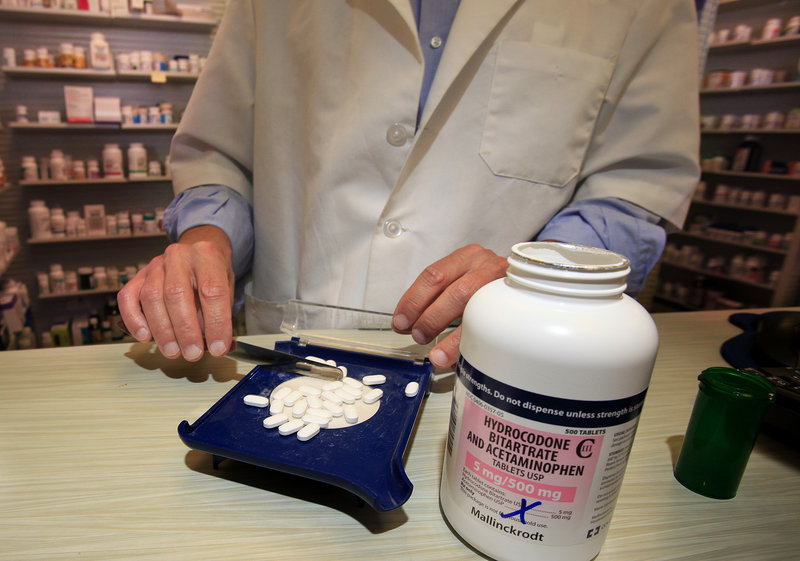WILTON – As president of the Maine Medical Association, I must respond to The Portland Press Herald editorial of Oct. 21 ( “Prescription drug crisis calls for team effort”).
The editorial accompanied the final article in the series of articles by reporter John Richardson on the serious issue of prescription drug abuse in our state. We congratulate Richardson on the excellent six-part series. We also appreciated the references to the association and our attempts over the past decade to better educate physicians about both the need to treat pain and to take all appropriate steps to prevent diversion or abuse.
As an orthopedic surgeon and as a recent patient, I understand the value of these medications for both short-term and long-term pain relief, but I also acknowledge that physicians and other prescribers of controlled substances have to do a better job of evaluating each patient, reviewing alternatives to drugs and informing them of the risks associated with opioid therapy, particularly for the treatment of chronic pain. I also appreciate the editorial recognizing that effectively addressing the scourge of prescription drug abuse in the state requires a team effort involving all elements of society.
WRONG TURN
Unfortunately, the editorial took a wrong turn in suggesting that physicians not participating in the Prescription Monitoring Program and those “hiding patients who are diverting medication” should be treated as lawbreakers “just like the dealers who distribute these pills.”
These incendiary comments show a lack of knowledge about the limitations of the PMP and of the problems associated with it. While the monitoring program is an important tool in preventing abuse, the program is limited in its impact and is sorely understaffed and underfunded. The state made a critical error in changing vendors and requiring a notarized re-registration by all the prescribers.
If providers did not re-enroll by Sept. 30, they were removed from access to the system. So a lot of the effort of the previous six years to encourage participation was set back.
There are also serious holes in the data, as the federal government does not allow the methadone clinics (there are eight in the state), federally licensed treatment facilities or the Veterans Administration facilities to report to the database.
Nor is there a similar program in New Hampshire or Canada allowing us to track patients who simply cross the border to acquire medication.
And there is only one dedicated professional assigned in the state to operate the system. As capable as she is, a more robust system built around the needs of prescribers would go a long way toward addressing the current crisis.
The vast majority of prescribers are taking appropriate precautions in prescribing controlled substances, including physicians, dentists, physician assistants, podiatrists and nurse practitioners. The few who are not should be re-educated and monitored. If improvement is not shown, the respective licensing boards should take action.
But treating Maine’s health professionals, charged with relieving the pain of patients, as criminals will simply make it more difficult for patients with pain to get relief and make it more difficult to attract and retain health professionals.
The World Health Organization has declared the undertreatment of pain to be an epidemic. The Joint Commission has for several years required its accredited hospitals to assess the pain of patients on a regular basis, using a scale of 1 to 10. Any physician who does not adequately address the pain of a patient risks a complaint to the licensing board.
BETWEEN A ROCK AND A HARD PLACE
On the other hand, a physician who follows all the recommended guidelines but prescribes medication that still may find its way to the street may also face board action.
As physicians, we are used to being caught between the proverbial rock and a hard place, but we need the assistance of regulators, policy makers, law enforcement and even the media in helping us to find that delicate balance between providing adequate pain relief and preventing diversion, misuse and addiction.
Again, on behalf of the 3,400 members of the Maine Medical Association, I congratulate Richardson, the Press Herald and its sister publications for focusing attention on this important issue.
If it takes a village to raise a child, it will take an entire state to solve the problem of prescription drug abuse and to address the tragic harm it causes to individuals, families and societies. Maine’s physicians are working hard to do our part.
– Special to the Telegram
Send questions/comments to the editors.



Success. Please wait for the page to reload. If the page does not reload within 5 seconds, please refresh the page.
Enter your email and password to access comments.
Hi, to comment on stories you must . This profile is in addition to your subscription and website login.
Already have a commenting profile? .
Invalid username/password.
Please check your email to confirm and complete your registration.
Only subscribers are eligible to post comments. Please subscribe or login first for digital access. Here’s why.
Use the form below to reset your password. When you've submitted your account email, we will send an email with a reset code.